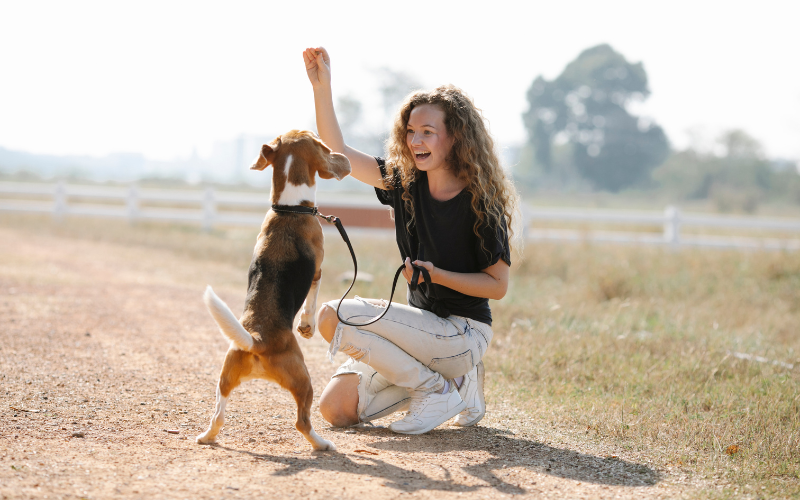When done properly, crate training is an effective way to housebreak, promote good sleeping habits, discipline and to keep your pup safe when they are alone. I recommend two crates- one in your bedroom and one in a common area like the living room.
Crate For Bedtime
- Your crate should be large enough to house your dog at adult size, but you will need to use a crate divider until they grow into the space. The initial space your puppy has should only be large enough for them to stand up and lay down comfortably. This way if they pee/poop they will have to lay in it. This is unpleasant and will discourage them from soiling the crate again.
- There should be nothing in the crate with your puppy except a chew-resistant toy. No blanket, no bed, no towel. This is the hardest rule for people to follow but it is essential. Any towels/blankets/beds will absorb the pee and your puppy will learn nothing. Trust me, your pup is just fine sleeping on the plastic. They will not suffer! As they mature you will be able to add in a blanket but that is months away. First things first!
- The first night I recommend having your pup’s crate set up next to your bed close enough so you can reach out and touch it. Your puppy will likely whine or cry periodically. If you have followed the housebreaking protocol (no water within 3 hrs of bed, a successful potty break before putting them to bed for the night) they are likely crying for reassurance. Stick your fingers thru the crate and use a reassuring voice for a few seconds. They may cry again after you remove your attention- when they do gently but firmly tell them ‘enough’. If they cry again you will say ‘enough’ a little more sternly and tap on the top of the crate. This should quiet them.
When your puppy cries and you follow the above steps, it will teach them that this is quiet-time and they will learn to turn ‘off’. Do not assume your puppy needs to go out to pee/poop when they cry in the middle of the night. They are much more likely looking for attention. When very young, just a little reassurance will do the trick. By around 5 or 5:30am they will need to use the potty, but they should sleep thru the night the first night they are home.
Crate For Discipline
- You will also use your crate for discipline purposes. ‘Wait!’ you say, ‘I don’t want my puppy to think of their crate as a punishment!’ The punishment is not in being crated; it is being taken out of the fun. Like a small child, your puppy will get overstimulated and behave inappropriately. I use the ‘three strikes’ rule. One verbal warning ‘Ow, that hurt! No’. If the puppy stops the behavior, great! If not, a second verbal warning with a bit more punctuation ‘NO’ and re-direct. When your puppy comes back at you again to chomp down on your fingers we are on strike three. Strike three is a ‘NO’ and an unceremonious scooping up, depositing into their crate, closing it, and walking away. If your pup cries or barks, you will need to tap the top of the crate with a stern ‘NO’ to remind them crate-time is quiet-time.
- You will need to leave them in the crate for five to ten minutes. Set your timer! If you forget to take them out in a timely manner the lesson will be lost. When taking them out of the crate go back to your removal protocol- outside to pee before access to the floor. Lastly, NEVER take a puppy out of their crate if they are crying or barking. Insist they be quiet for at least 30 seconds at this age before you take them out.
You can use crate training as discipline for any type of unwanted behavior, just remember to give your dog three strikes first to see if they can self-regulate when warned. And don’t forget to set your timer!
Crate For Sanity
For the first few weeks of having your new puppy they should never be out of the crate without your full attention. This is why having a second crate in the kitchen or living room is so useful. It is impossible to watch your puppy sufficiently while cooking or taking a shower, etc.. These are times your very young pup should be crated with a nice chew toy or bone. Your 100% attention when they are out of the crate is necessary to catch them doing unwanted things like pooping on your floor or chewing your electrical wires.
Final Thoughts
The more consistently you follow these rules the sooner your puppy will be reliable enough to have more freedom. The more they sacrifice freedom as a young puppy the sooner they will have freedom as an older pup and then for the rest of their lives. Set your puppy up for success by laying a logical and consistently reinforced routines and discipline. Praise and love are the easy parts!


